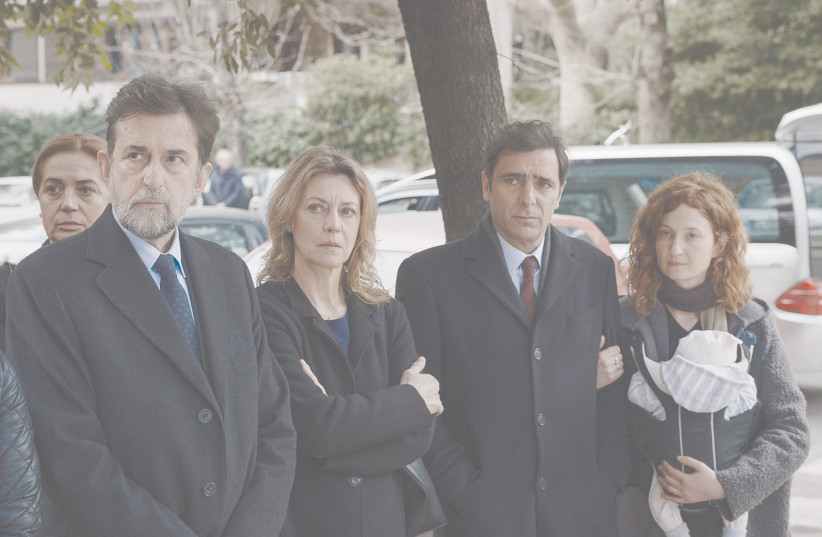There is something Jewish about the movies of Nanni Moretti, whether he is lampooning a reluctant pope or looking at a family caring for their ill mother, so it seems quite natural that he would choose to adapt a novel by an Israeli writer, Eshkol Nevo’s Three Floors Up, the film version of which, Three Floors, opens throughout Israel on April 14.
While it was exciting news when he announced his new movie would be based on an Israeli novel, unfortunately Three Floors is a rare misfire for Moretti.
The director, who is best known for the 2001 movie that is considered his masterpiece, The Son’s Room, about a family recovering from the death of a young adult son, makes movies about often likable and always understandable characters.
He almost always acts in his films, as well as directing and writing them, and his gentle, bearded presence brings a low-key charm to every scene in which he appears.
Characters in his movies are often preoccupied by family issues and are haunted by a sense that they are failing those they love. These issues of love and guilt give his movies a kind of Jewish vibe, although he and the characters are not actually Jewish.

With Three Floors, Moretti moves the setting of Nevo’s novel to Rome, but he is quite faithful to the spirit and structure of the book. Like the novel, the movie features interconnected stories of conflicted tenants of a single building, but he opens it very cinematically by bringing together all three stories in a single shocking moment, as a fatal car accident affects tenants from every floor.
Andrea (Alessandro Sperduti), a young man with little focus and ambition, who lives with his father, Vittorio, (Moretti), a distinguished judge, and his mother, Dora (Margherita Buy), crashes his car heedlessly into the building, killing a pedestrian. The car smashes through a wall and into an apartment, where Francesca, a little girl, watches in terror. Meanwhile, Monica (Alba Rohrwacher), one of the other tenants, narrowly misses being hit by the car as she heads to the hospital, alone, to give birth.
The rest of the movie shifts back and forth among the stories of each apartment. The car crash plays an important part only for the judge’s family, where Andrea is sure his well-connected parents can get him out of serving prison time. Vittorio wants to disown his son after the accident, while Dora thinks they should hire a high-priced lawyer to defend him, and the conflict destroys what remains of their marriage.
Lucio (Riccardo Scamarcio) and Sara (Elena Lietti) have been leaving their daughter with an elderly neighbor couple who always seemed like ideal babysitters, until the husband, Renato (Paolo Graziosi), begins showing signs of dementia.
After Renato takes the girl out on a walk at night and the two get lost, Lucio becomes obsessed with the idea that Renato has been molesting his daughter, even though the girl says nothing happened and a psychologist insists there are no signs of abuse.
As Lucio’s obsession grows, he goes to bed with Renato’s underage teen granddaughter, Charlotte (Denise Tantucci), who, in a story line sure to offend some, seduces him very aggressively.
Monica tries to be a loving mother to her daughter, whom she spends most of her time raising alone, because her husband is away on business. But she has inherited a tendency toward psychosis, and begins seeing visions and entertaining delusions that make her an unfit mother, in spite of her kind heart.
Her husband, Giorgio (Adriano Giannini, the son of actor Giancarlo Giannini), knows of her family history of mental illness but inexplicably continues to leave her alone for long periods of time.
The movie covers about 10 years, and the plots meander rather than develop. Lucio is brought to trial for statutory rape for having sex with Charlotte, and his wife stands by him, although she is not very happy about the situation. Monica’s illness worsens, and a subplot about her criminal brother-in-law adds nothing to the film. Vittorio gets angrier and more rigid, forcing Dora to see their son secretly.
THE FRUSTRATING script raises questions that remain unanswered, notably why Lucio is so concerned that a man has molested his daughter. Does he accuse their neighbor of abuse with no evidence because he also has such impulses, and is that why he soon has a sexual affair with an underage girl whom he has known her entire life? It would be interesting to have some idea of what his obsession meant.
As the movie goes on, it becomes harder to care about the characters, and Moretti strains for an upbeat ending, which seems contrived.
He still finds the humanity in the characters, inviting the audience to embrace them, and they are like an extended, if often dysfunctional family. No one here is purely good or evil, and no one is completely reliable. While some of the situations are interesting, none of the plot adds up to much.
The movie is a missed opportunity, especially because it features some of Italy’s finest actors. Bay and Rohrwacher are especially good in roles that ought to have been very interesting. But the assured and often light touch present in so many of Moretti’s other movies is absent here, where everything is portentous and heavy, with no real payoff.
